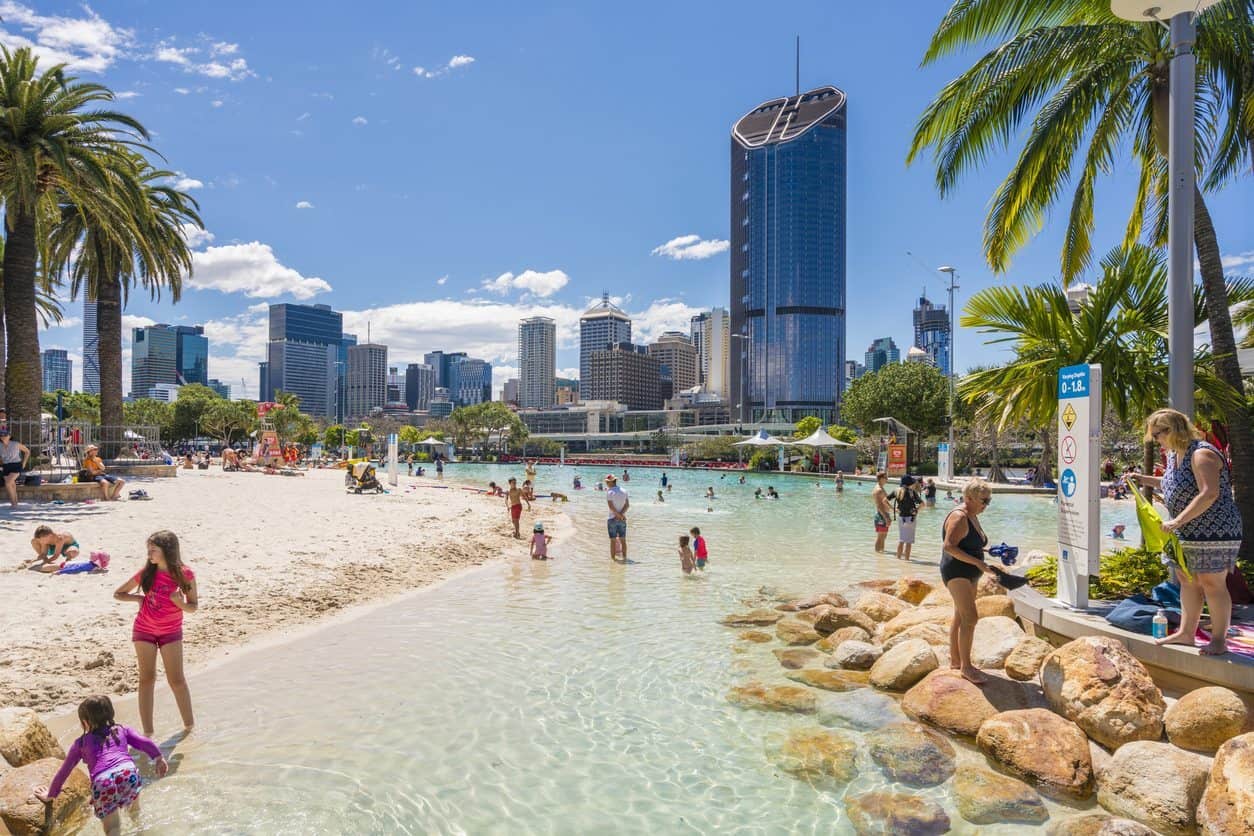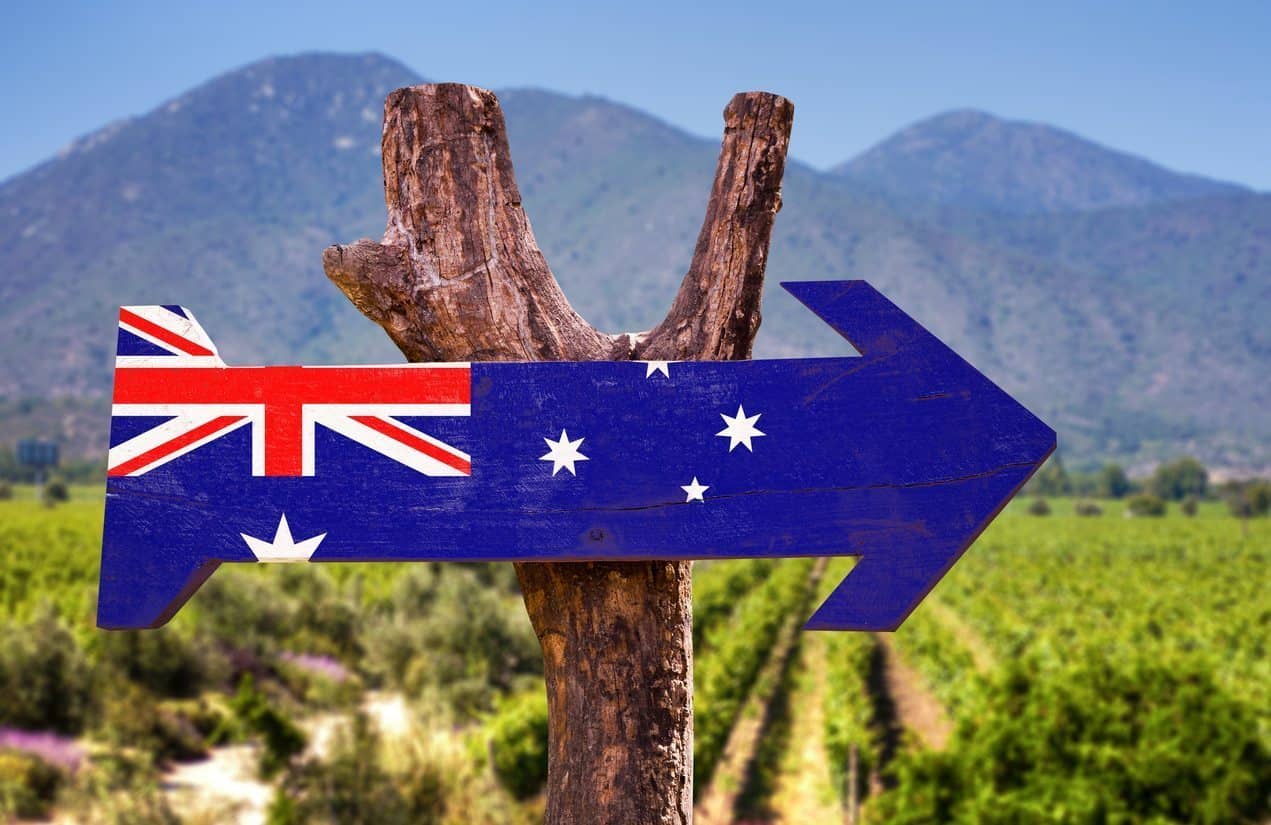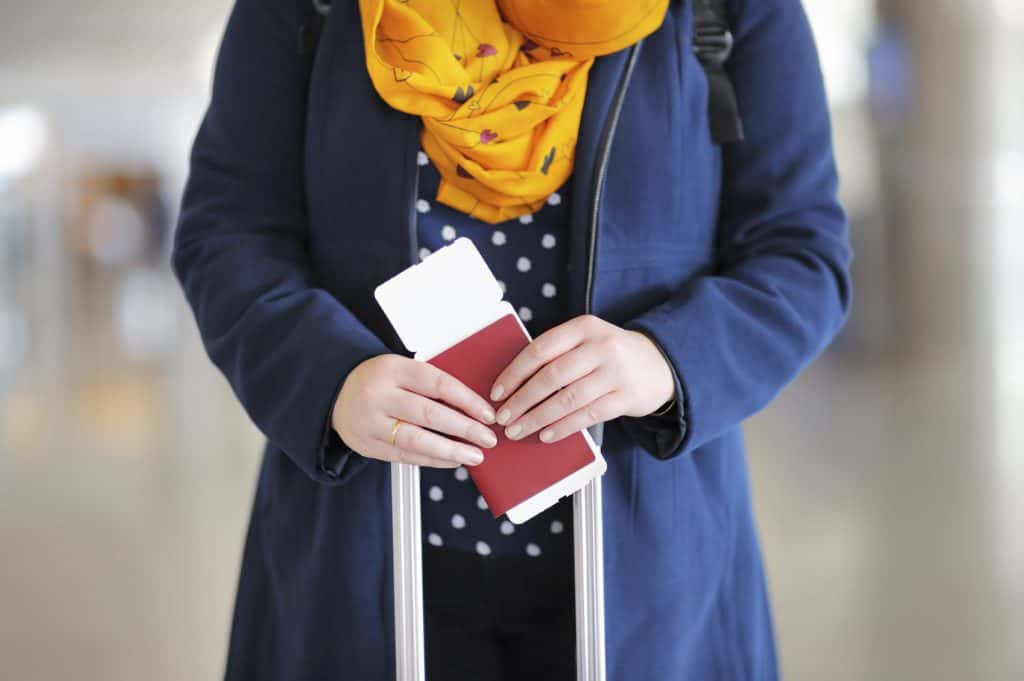
Life Australia: Everything you need to know about living in Australia
Live in Australia - Free Advice
Live Australia with Go To Australia - Free Advice on your life in Australia. Want to live in Australia? Apply now if you are interested in living in Australia! Registered experts answer your questions.
Australia is a relatively new country without a long history but the history it does have is fascinating and in some ways devastating. When Europeans settled in Australia during the 1700s they did not take into consideration the natives of the land and the Indigenous Peoples of Australia were treated poorly.
Located in the Southern Hemisphere; Australia is a unique, multicultural country with a diverse range of races, population, climate, history and geography.
Australians are generally a friendly, laidback people with an outgoing sense of humour (Aussies love a good laugh).
The coastal towns of Australia is where most of the population can be found as the Outback is mostly dry, desert land where water is scarce and the heat soars.
Buying a house is relatively easy in Australia as long as you have had a job for at least six months.
Other aquatic adventures Aussies partake in include surfing, sailing, diving and for the children nippers (where Aussie kids are taught water safety). Visitors to Australian shores need to be sun smart as those who do not cover up and apply sunscreen regularly are exposing themselves to sunburn and possibly skin cancer.
Along with its competitive nature, Australia is an inventive nature with world class inventions including (but certainly not limited to) the Hills Hoist (rotating clothes line), plastic disposable syringes, long-wearing contact lenses as well as the bionic ear.
Personal Safety
Whilst living in Australia is relatively safe, you should still take precautions to protect yourself and your belongings. At night, don’t walk alone, keep to well-lit paths and avoid empty or isolated areas.
At all times of the day, keep your valuables secure and out of view, and be conscious of your surroundings. Lock all doors and windows whenever you leave the house, and preferably while you are at home as well.
All Australian homes are fitted with compulsory smoke alarms to protect you from fire; you should check the batteries twice a year.
Australia’s beaches are a major attraction. Check that the beach you swim at has a lifeguard, and always swim between the red and yellow flags. If you go out on a boat, ensure you wear a lifejacket.
Abiding by the Law
Certain laws in Australia may differ to the ones you are used to. Laws relating to alcohol and tobacco prohibit their sale to persons under the age of eighteen. Smoking is prohibited in most indoor public areas as well as many outdoor ones. All illicit drugs are banned from sale, possession or use.
In the course of public life, it is an illegal offence to offer or receive a bribe. Furthermore, you cannot discriminate against a person on the basis of gender, race, nationality, political or religious beliefs, marital status, disability or sexual preference.
It is a crime to commit violence against any person, animal or property, as it is to carry any kind of weapon.
On the road, Australian law requires a helmet to be worn when riding a bicycle or motorcycle, and that every driver to hold a valid driver’s license.
Managing Finances
If this will be your first time living independently away from home, brace yourself for the realities of financial responsibility! Research, planning and self-discipline are all practises that will serve you well during this adjustment period. Try to research and forecast the cost of everything, as there can be hidden costs in each transaction.
Particularly when evaluating accommodation alternatives, consider all cost factors: rent, cost of transport to and from your institution, and any utilities included in the rent price. You should also ask whether the rent is likely to be increased during your tenancy.
Utilities, food and groceries, tuition fees and textbooks are all expenses which can sneak up on you, so try to calculate and budget for them in advance.
Holders of Student Visas are permitted to work 20 hours per week, however well-paying part-time work can be hard to be find. You should never count on part-time work to finance any of your essential living expenses.
Student Life in Australia, what to expect on your everyday routine
Living in Australia is an experience like no other, from a new environment, a new continent, to meeting new people and friends and experiencing a journey that you never thought you would, so here is what you can mostly expect on your everyday journey doing everyday things:
Shopping
Australia is also known for shopping and buying great items. The hours of the malls usually run from 9:00am to 5:00pm seven days a week, with late night shopping until 9:00pm on Thursday and Fridays, so enjoy those days and go out late to shop once your school work is done. Some supermarkets open 24 hours a day, seven days a week, which is great if you ever just need to go grab something for dinner or you forgot an item. However, keep in mind most large chain supermarkets, like Coles and Woolworths, are open until about 10pm every day, still giving you enough time to go get anything you need.
Banks
There are many banking institutions which mean many options. Normal hours are from 9:30am to 4:00pm Monday to Thursday and 9:30am to 5:00 pm on Fridays. Some banks are open on Saturday mornings, but all are closed on Sunday and public holidays. Automatic teller machines (ATMs) are ready fro withdrawals 24 hours a day.
Most stores and supermarkets have Electronic Funds Transfer at point of Sales (EFTPOS) terminals where you can pay for your good directly from your bank account, so as long as you have the money in your bank account to cover what you are buying just use the EFTPOS to purchase your items and you can even make withdrawals. This is another reason why is not so important to carry large amounts of cash with you on hand, you can visit any EFTPOS and quickly withdraw money and pay for items.
Australia’s four major banks with branches are the Commonwealth Bank, ANZ, Westpac and National Australia Bank (NAB). There are plenty of smaller banks too are just as good. You can search for more banks at www.infochoice.com.au.
Postal services
Want to send something to someone and make sure they get it? Postal services are provided by Australia Post and mail delivery; services are from Monday to Friday. For larger packages, a card will be left in your letter box for you to take to your post office to pick up the item. The postal service is reliable, you can count on them to deliver your package or making sure you receive yours, they are efficient with next day delivery, within the same city too! Most post offices are open from 9am to 5pm Monday to Friday. They also sell stationery, post bags, phone cards and stamps; you can pay some bills here too, like electricity and telephone.
Telephones
In Australia local calls can cost about 30cents and are not timed, so for 30 cents you talk all you please. Interstate and international calls costs vary depending on your service provider. If you have broadband access at home, if can be cheaper to set up a VOIP (Voice over Internet Protocol) plan for your calls.
Public telephones are available an accept coins and pre-paid phone calls. Cell phones are also very popular and are available from a variety of service provider. You can purchase a pre-paid phone or a post-paid phone (contract phone service).
A pre-paid phone is a great option for students with limited funds. You pay for the phone handset upfront (or buy a basic phone for under $100). A post-paid phone handset is generally free, unless you want something more particular with certain elements included then it can cost you and no matter what you will be bind to a contract with the provider for two years. You just need to establish which plan would be best for you and your needs.
You can find some plans that cost as little as $20 a month that provide you with $100 worth of calls and text messages.
Major telephone service providers in Australia are Telstra, Optus, Virgin Mobile and Vodaphone.
Internet
Australia has hundreds of Internet Service Providers. Plans vary in cost and speed of downloading. You can find information at www.broadbandguide.com.au. Depending where you live is the options you might have and it’s also the speed you might get.
Libraries
Public libraries in the cities, town are usually open six days a week (closed on Sundays) and stocks plenty of books, CDs, DVDs, newspapers, magazines, journals and e-books. If your library does not have what you are interested in you can place an order at another library that does have what you are looking for and ask the library to order it for you. Borrowing items are free but you will need to join the library in order to have this access and therefore would have a membership card.
You have a period of time with the items you took out and late fee will incur a small fee.
Television
Since March 2009 the free to air digital network has up to 15 digital channels. You do not need to purchase a license to view free to air or digital channel but there is a monthly subscription fee for the channel available on Foxtel and Austar.
Newspapers
The Australian (www.theaustralian.news.com.au) is Australia’s national newspaper. Each state has is own major newspaper as well as several regional newspapers and tabloids.
You can do a search for your local paper on www.newspapers.com.au
New South Wales
The Sydney Morning Herald – www.smh.com.au
Victoria
The Melbourne age – www.theage.com.au
Queensland
The Brisbane Courier Mail – www.news.com.au/couriermail
Australian Capital Territory
The Canberra times – www.canberratimes.com.au
South Australia
The Adelaide Advertiser – www.news.com.au/adelaidenow
Western Australia
The West Australian – www.thewest.com.au
Northern Territory
The Northern territory News – www.ntnews.com.ua
Tasmania
The Hobart Mercury – www.news.com.au/mercury
There are also locally produced foreign-language newspapers available in Australia and some international locales in some districts. That way you can stay up to date with everywhere.
Multicultural community groups
Joining groups associated with your home community can be a good way of finding support in Australia, making new friends, learning more about yourself. There are many ways you can join a community group, for instance where you live they have groups formed already, or in your institutions you can join a club or social activities, you can even create a group yourself and post up adds for anyone interested.
Some handy website links to help you find groups in your areas:
Australian Capital Territory www.communitiesonline.org.au
New South Wales www.communilink.org.au
Victoria www.multicultural.vic.gov.au
Western Australia www.multicultural.online.wa.gov.au
Tasmania www.tas.gov.au/tasmaniaonline
Queensland www.multicultural.qld.gov.au
South Australia www.multicultural.sa.gov.au
Northern Territory www.nt.gov.au/dcm/multicultural
Links provided by the Australian government
Way of life in Australia
If you travel around the world, you will most likely be able to see that etiquettes, values and social behaviours can be quite different in different countries. Sometimes you may even experience differences between cities of the same country! Regardless of where you are from and what you're used to, you will still find some differences between your way of life and the Australians' way of life.
To make the most of your visit to Australia as an Au-pair, it is very important to learn as much as you can about Australia and its people. To help you get started, here is a short list of what the OZ way looks like:
- Addressing people- When you would like to get attention from those older than you are, always add Mr, Mrs, Miss or Ms in front of the persons' family name. However, if the person feels comfortable, he or she may ask you to call them using their first name. When addressing people who are your age or younger, you can usually address them using their first name.
- Greetings- To greet someone formally, use phrases such as good morning and good evening. To greet someone in informal situations, things like hi, hey and hello are fine.
- Please and Thank you- Be polite and use please and thank you when you ask for something and when you receive something.
- Clothing- You can dress casually and comfortably in almost all situations in Australia. If you're required to dress up, you will normally be informed beforehand.
- Personal space- Don't stand too close to anyone in any situation. An arm's length is usually a good distance to keep.
- Queues- People stand and wait in a line for services (e.g. Ticket counters, taxis). A line of people in such a situation is called a queue. If you wish to receive the same service, you need to go to the back of the line and wait like everyone else. It's very impolite to 'jump the queue', so don't do it!
- Be punctual- If you arrange to meet someone at a certain time, try to show up at that allocated time. If you cannot make it to the meeting, call to let the person know beforehand.
- Smoking- Smoking is banned in most private and public buildings. If you're unsure and would like to smoke, ask to get permission.
- Fair go- Australians believe that everyone should get equal opportunities. The belief that everyone should be able to get a 'fair go' is one of the most significant values held by Australians. The Australian Constitution also protects the social, political and legal rights of all people in Australia.
- Spitting- Don't spit in public, it is unpleasant and also illegal.
- Littering- Don't litter. If caught, you may be fined.
- Personal hygiene- You should shower daily and frequently wash your hands. If you're blowing your nose or if you sneeze, cover your mouth and use either a tissue or handkerchief. This is polite and it can minimise the spreading of any potentially harmful diseases.
- Table manners- You will usually be expected to use cutlery. However, at informal meals (e.g. Picnic or barbecue), you can usually use your fingers. If unsure, watch what the others are doing or ask.
- Cultural exchange- It is important to look at the au-pair experience as an opportunity to share your culture and to learn about the culture of your host family. Essentially, you are exchanging cultures. So, share your own cultural perspectives and also keep an open mind, be understanding and be willing to learn, look at and do things differently.
- Communication- It is extremely important to communicate with your host family and your programme coordinator. Tell your host family about your day with their children, share stories, discuss concerns and feelings appropriately. Be respectful, polite and honest when communicating.
- Responsibilities- It is important that you understand what is required of you and take your responsibilities seriously and complete the tasks to the best of your ability. Taking good care of your host familys' children will be an essential part of your stay. Other responsibilities may include cleaning after yourself and helping with cooking.
- Respect- You should respect your host family and expect to be respected in return. You should be considered as a member of your host family. You should complete all tasks and responsibilities given to you as best as you can, but you should not be treated like a servant in anyway. Mutual respect is key and it can be achieved through communication!
As a society, Australia is rated very well around the world. It has the highest living standards of any country in the southern hemisphere. Australia is rated highly by the United Nations (UN) Human Development wing and has consistently topped the list for livability and economic endurance. Australia?s capital cities have been voted the most livable in the world and with small crime rates, stable democratic systems, good employment prospects, and a highly functioning and harmonious multicultural emphasis.
Australia is a country that is exceptionally attractive for prospective migrants. With its mix of natural beauty, tremendous mineral resources, highly developed communications and technological edge, Australia has sustained 10 years of economic growth at 4% per annum. That has been accompanied by low inflation and low interest rates, while the next five years look to be prosperous as well with the economy expected to grow by 3% per annum.
Population wise, Australia has a similar growth rate to Europe and Australia?s migrant program accesses the gap between available employment and the people who are available to fulfill those positions. That means, that Australia has a highly thought through migration program that seeks to place people in employment as quickly as possible in jobs that meet and match their particular educational qualifications, experience, and skill set.
Australia is a highly developed country with natural and awe-inspiring beauty, technologically savvy, and is unique in world history with the world?s oldest continuous culture (50 000 years) and the planet?s only continent that is its own country. Australia, both modern and aboriginal is worth understanding. The country?s economic indices, excellent quality of life, and multicultural emphasis, that is open to immigration from other countries makes Australia a great place to immigrate too.
And Australia is seeking migrants who have education and/or vocational training. Australia also seeks to reunite families as part of its migration programs, along with programs directed at refugees and those desiring refugee status. The Australian government is dedicated to a policy of active anti-discrimination and in 1996 the Prime Minister made a parliamentary statement that emphasized anti-discrimination as part of government policy that was accepted by the House of Representatives who voted unanimously to endorse the statement.
The statement affirmed Australia's commitment to actively countering racial and social intolerance regardless of race, religion, creed and so forth. The Australian government affirmed the principles of equality for everyone who lives in Australia, is a citizen, or travelling through the country.
We in conjunction with our affiliates, have special deals to offer to make your stay in Australia even more enjoyable.
You will find that going to the beach on New Year’s Eve or skiing in July/August is very popular in Australia as this continent is part of the southern hemisphere. Australian summer days can be very hot, whereas during winter the days are still warm and dry, but the nights are much cooler.
Outdoor activities (especially barbeques) and all water and sports activities make life very appealing in Australia.
There are many opportunities for you to explore life in Australia either individually or in small groups during day trips and over a longer period.
Extraordinary places to experience the natural environment include The Great Barrier Reef, Kakadu National Park and Ayers Rock, or you may be interested in the exciting life in the large cities of Sydney, Brisbane, Melbourne or Perth.
If you are a commercial provider of services related to tourism, you may ask us for a special advertisement package.
Social Life in Australia
Australia has a lot of respect for its egalitarian policy. Even though this is so one has to acknowledge the fact that there still exist different social classes to which different people belong. These classes may be classified as the upper class, middle class and the working class.
The upper class largely consists of people who are property owners as well as those who control capital.
The middle class has those people whose jobs are classified as non manual. Some of the professions in this class are doctors, accountants, engineers among others.
The working class largely consists of those in occupations that are manual in nature. There is however a belief that socioeconomic mobility is possible. This is even supported by the 'give one a fair go' attitude among Australians.
When it comes to symbols that show the class in which one belongs to, not all can give a clear cut line of distinction between two consecutive classes. The upper class may dress in expensive clothes, drive expensive cars and live in up market dwellings.
Material things however can be a misleading indicator. Take clothes for example, other than money, there are other factors that influence the clothes that a person may choose to put on. For example some well-off teenagers may have clothes in line with the fashion more that those that would be said to be of their class.
Also, one may choose to dress in a style that is depicting a certain subculture rather than class. In the same way those in the middle class may dress expensively and drive expensive cars bought by money from a loan.
The better class symbols are such things as the entertainment preference, engagement in certain types of sporting activities, speech patterns as well as arts.




